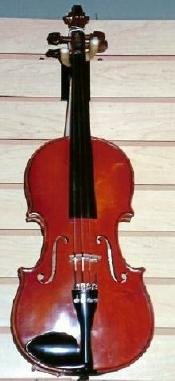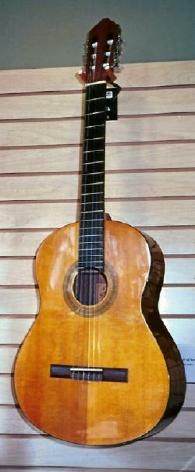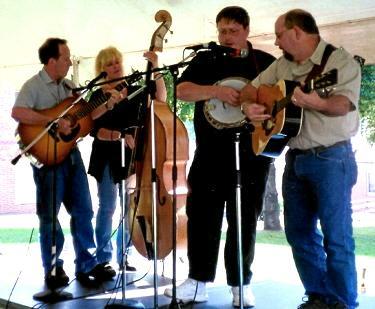 This article appeared, in slightly different form, in Allegany Magazine, May 2007. Copyright © 2007 by Mary Meehan. Bluegrass Heaven Mary Meehan It's Sunday night at the Queen City Creamery in Cumberland, Md., and the bluegrass jam session is going strong. Toes tapping and fingers flying, the guys are hot tonight. "Not too fast," cautions one of the singers. "I've got some words to get in there." Donnie Gibson starts the group off with his banjo and a "one-two-three!" He loves the fast ones, both for playing and singing. Tonight he's having fun with "Hot Corn, Cold Corn" and "Come Down the Mountain Katie Daly." His friend John Knippenberg, who plays guitar, favors slower songs, many of them haunting and sad--"Nobody's Child," for example, and "I Haven't Seen Mary in Years." Kevin Mallow, who plays nearly every bluegrass instrument, likes the banjo for fast music, the guitar for slower songs, and the fiddle for either. His father, Art (Bud) Mallow, plays guitar and likes to sing the songs he remembers from childhood. "I revive a lot of stuff that hasn't been heard for years," he says. Bluegrass music has plenty of room for all of this. It takes its name from Bill Monroe's "Blue Grass Boys," a pioneering band that started in the late 1930s and lasted for decades. While bluegrass resembles old-style country music, it has its own distinctive approach. Jeff Munson, a regular at the jam sessions, explains that it involves "a lot more drive" and is "a lot faster than any of the country songs that you hear." Bluegrass, he adds, has more "intricate noting" and breaks down to about 50-50 between vocal and instrumental tunes. The instrumentals can be extremely fast. There's still room, though, for the slow and mournful songs and for gospel music. They provide a needed break when the instrumentals have become very fast and intense. There's room for different styles in the singing, too. John Knippenberg and Shawn Twigg excel in the high-pitched singing that's called the "high lonesome sound" of bluegrass. The Mallows and Jeff Munson have the flair and richness of old-time country singers. Dr. Bill Becker, who plays bass, started the jam sessions several years ago. At first there were just a few people, playing under a tent in a parking lot. But Rick and Terry Michels had opened their Queen City Creamery nearby and were renovating the second floor of their building. They offered the group free use of an upstairs room. The musicians were happy to have air conditioning in the summer, heat in the winter, and freedom from bugs, rain, and traffic noise. Word of the sessions spread; more musicians started dropping by; and a loyal audience developed. There's no cover charge; but many fans buy a sandwich and coffee, or a strawberry-shortcake sundae, or a double-dip chocolate cone to enjoy while they're listening to the music. Becker had played guitar in the folk-music heyday of the 1960s. He started listening to bluegrass later, as a medical student in Baltimore, then began attending festivals. After moving to the Cumberland area in 1991, he recalls, he "heard about a few of the bluegrass pickers around here." He got to know them, and one started "showing me some things" about playing the upright bass. Then Becker's wife gave him a bass as an anniversary present, and he was off and running. "I enjoy the heck out of playing the bass," he says. He enjoys singing, too, and does a mellow rendition of "Gold Watch and Chain." Most of the regular players are from the Cumberland area, but musicians from elsewhere stop by and play from time to time. The players come from all walks of life; they include a barber, two physicians, truck drivers (current and retired), and several men in the construction business. Many grew up in musical families. Jeff Munson says his father was an excellent musician, and adds: "Every instrument that I can think of, he could play." Jeff started on the standup bass when he was only six or seven years old. Because he "couldn't reach the top two frets," his father had him stand on a box to play. Later he switched to the guitar, which he plays very well and very fast.  Bob Boyce, who plays bass and mandolin, notes that both his parents "played guitar and sang." He admits that "I used to make fun of my Dad, playing this type music." His father told him, 'One of these days, you'll grow up, boy,' and he acknowledges that his father was right. Boyce's own five children are all grown now. One son plays guitar, another is learning the banjo, and his daughter and her husband "sing and play in church a lot." A granddaughter, Julie Boyce, is a singer who also writes gospel songs. Bud Mallow recalls that his parents often performed at square dances. His father played fiddle and mandolin. His mother played guitar and "had the most beautiful voice you ever heard.... I used to sing with her a lot, and that was one of my biggest joys...I really miss her a lot." He still plays the guitar she left him. Six instruments are common to bluegrass music: banjo, guitar, mandolin, fiddle, upright bass (also called standup bass), and Dobro (a special type of guitar that's held flat on one's lap and plucked). Amazing to non-musicians is the number of instruments some jammers have played. "I started with the guitar," Bob Boyce reports, "and then I went to banjo. Then I went to this [bass]. Then I went to mandolin; I'm learning that now." Donnie Gibson has played other instruments, "but the banjo has always been my first love. I've worked at it a long time; I still work at it." In the past, he has spent as much as "five hours a day on it, just trying to learn something." He makes magic with his banjo; when he plays "The Bells of St. Mary's," you hear the bells ringing, and when he does "My Grandfather's Clock," you hear the clock ticking. He never took formal lessons. "We all started out about the same.... You just picked up from one another." An exception is Kevin Mallow, who played classical violin in an orchestra at Cresaptown Elementary School. "Two years of classical training," he recalls, "and then I broke out on my own." Skilled on many instruments, and a fine singer besides, he performs professionally on a part-time basis. Several other regulars at the jam session have done the same, or still do. But going full-time is "hard to do and make a living," Kevin says. On the road, a bluegrass musician "can work 300-350 days a year and only make $20,000-25,000. That's a lot of time and hours for what compensation you're getting." It's Sunday again at the Queen City Creamery, and you can feel that bluegrass drive. "Lay on it!" says Donnie Gibson. Jeff Munson goes even faster on his guitar, and Donnie approves with a raucous "Yeah!" John Knippenberg is contemplating what song he'll sing next. Somebody proposes one, but John complains, "You're breaking my thought." Later he suggests the group is playing too fast, mentioning "that gallop you did on that one roll." (While he likes to play the grouch, he'll tell you privately that bluegrass is "a lot of fun, lot of good people.") Selections by others include "Wabash Cannonball," some love songs, and a couple of prison songs. Dr. Ken Roberts puts the despair of a life-termer into his mournful singing of "Shackles and Chains." Attracted to bluegrass in college, he has been hooked on it ever since. He has played a "little mandolin, but mostly guitar," and does much to promote bluegrass in the Cumberland area. Kevin Mallow fiddles a couple of fast tunes. "More, Kevin, more!" an audience regular calls out. Kevin is so hot on the fiddle tonight that another fan says, "Somebody get a water bucket!" Still another asks, "How about a waltz, Kevin?" He obliges with a pretty one. Later his father joins the group, singing "Let's Live a Little Before We Say Goodbye" and "I'm Going Back to Old Kentucky." Jeff Munson sings "I'm Using My Bible for a Roadmap," and Donnie Gibson does spirited renditions of "Prayer Bells of Heaven" and "I Saw the Light." The audience joins in on the old favorite, "Will the Circle Be Unbroken." When Shawn Twigg's son Evan was only three years old, Evan wanted to sing at a jam session but was shy about it. Kevin Mallow, a big guy, reached over and picked him up--like a papa bear picking up a cub--put him on his lap, and coaxed him to sing. The others played very softly to encourage the little boy. It was a lovely moment.  Ken Roberts, Tina Hamman, Kevin Mallow & Jeff Munson performing at Appalachian Festival, Frostburg State University, Frostburg, Md., in September 2007 |